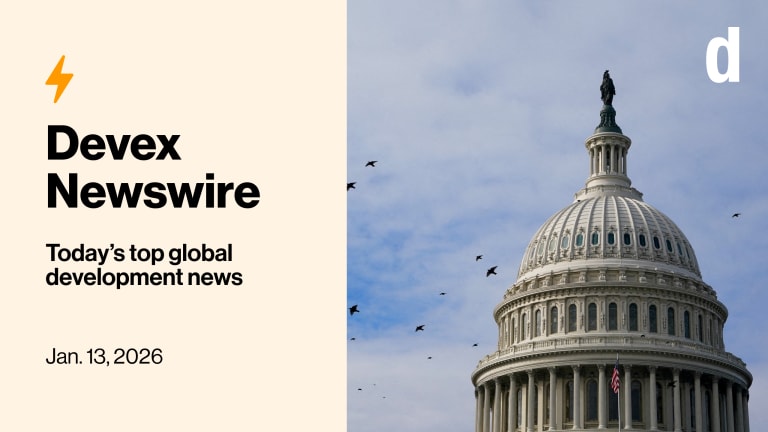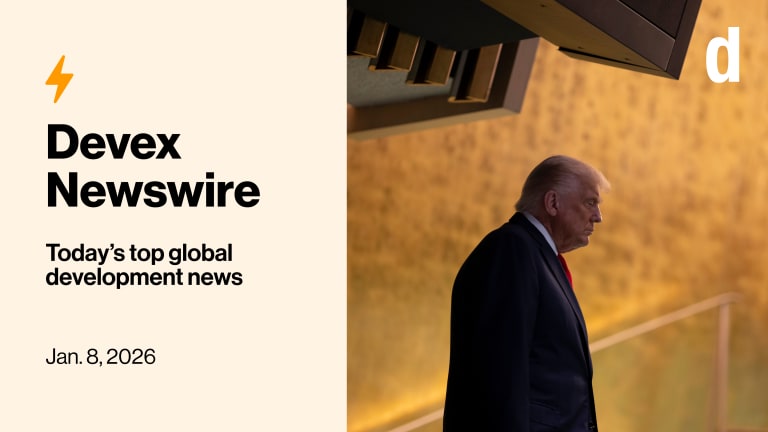
With the U.S. withdrawing from its leading role in global aid, China has an opportunity to fill the void — which has some warning about the implications for human rights and democracy.
Also in today’s edition: WHO’s hoping for funding hikes, and Gavi has at least some safe funding to continue its work.
+ How can countries adapt to U.S. global health funding cuts? Join our event today, March 5, at 12 p.m. ET to discuss the impacts and possible solutions. Save your spot now.
Eastern promises
This is a preview of Newswire
Sign up to this newsletter for an inside look at the biggest stories in global development, in your inbox daily.
As the U.S. steps back from its foreign aid throne under U.S. President Donald Trump's “America First” stance, the big question is, who's going to fill the void? Enter China, already creeping up the donor leaderboard and now eyeing a bigger slice of the global influence pie. But there's a catch: increased Chinese involvement might mean trouble for human rights and democracy efforts worldwide.
Melissa Conley Tyler, as executive director of the Asia-Pacific Development, Diplomacy & Defence Dialogue, is right in the thick of it. As soon as the U.S. hit pause on funding, she heard stories of China swooping in with offers to fund programs the U.S. had abandoned — from demining in Cambodia to development gigs across the Pacific and Africa.
“It's not theoretical. We know it's happening,” she says. Development assistance is seen as a form of soft power and a way to build relationships with other countries. Somebody has to step in “if we don't want a complete collapse of the sector.”
China's aid comes without the human rights strings attached, potentially tipping scales toward more authoritarian vibes where it lands, Devex contributing reporter Rebecca Root writes.
Experts such as Yanzhong Huang, senior fellow for global health at the Council on Foreign Relations and an expert on China’s role in global health policy, are sounding alarms too. The U.S. pulling out could seriously shake up the geopolitical game — and not in a good way. Democracy and human rights are already on shaky ground in many places, and with China stepping in, he says, there could be some backsliding.
“Some countries might welcome this development, but scholars are concerned that the pull-out of support for the rule of law, civil society, and governance could have implications on democratic consolidation,” Huang says.
Read more: The US aid freeze has left a funding gap. What if China steps in? (Pro)
+ Not yet a Devex Pro member? Start your 15-day free trial today to access all our expert analyses, insider insights, funding data, events, and more. Check out all the exclusive content available to you.
WHO’s top of the list?
With the U.S. bowing out, the World Health Organization is facing a financial crunch. Member states now face tough choices on what WHO functions to keep afloat. Björn Kümmel from the German Federal Ministry of Health laid it out in an interview with WHO transformation chief Dr. Søren Brostrøm: “I think that we have not done a great job over the last decades to clarify what is the core of WHO’s mandate,” he said. “What are the functions that only WHO can perform, and nobody else?”
Currently, the prioritization process is set to be discussed at the World Health Assembly in May, with member states clamoring to have a say. But “it's going to be a tricky exercise,” Kümmel admitted, noting the struggle to prioritize amid a flood of resolutions that often lack the funds to back them. He's pushing for a quicker solution, hinting that waiting until May might be too late given the current "financial crisis."
In the mean time, WHO is scrambling to cut costs — think hiring freezes and less travel — while also kicking off a fundraising sprint to draw funds from the public. Despite these efforts, a budget slash looms on the horizon, with some hope pinned on increasing member contributions as a financial lifeline, Devex Senior Reporter Jenny Lei Ravelo writes.
WHA is also the moment to see if the next phase of funding hikes will get the green light.
“I'm optimistic,” Kümmel said, “but I think we need to push, obviously, on all sides that really the countries who have to pay more, especially also due to the shifting U.N. scale of assessment, are convinced that this is good.”
Read: With WHO in crisis, prioritization can’t wait, warns German official
The only weigh
Obesity rates are soaring worldwide, driven by increased consumption of ultra-processed foods.. Africa in particular is facing a 215% jump in moderate obesity rates for adults between 2010 and what’s projected in 2030.
However, the issue is compounded by the “double burden” of malnutrition in many regions, where undernutrition exists alongside growing obesity rates. “The number of those who are overweight or obese is actually higher than those who are underweight in many cases,” Agnes Erzse of UNICEF points out.
The World Obesity Federation's latest report — coinciding with World Obesity Day yesterday — urged a robust, society-wide approach to curb these rising numbers through food taxes, advertising limits, and better urban planning to encourage active lifestyles. However, progress is hampered by food industry lobbying, which often dilutes these efforts, Devex Global Development Reporter Ayenat Mersie writes.
In Africa, policy progress such as South Africa's pending food labeling and marketing rules could set a precedent, while UNICEF's Fix My Food initiative supports young advocates to drive change. Furthermore, coordinated efforts in southern Africa aim to develop regional strategies to tackle obesity more effectively.
Read: Obesity is on the rise in Africa. Here’s what UNICEF is doing about it
+ For more content like this, sign up to Devex Dish, a weekly newsletter on the transformation of the global food system.
Shaky shots
Despite the USAID funding debacle, vaccine alliance Gavi is still on its feet, vaccinating kids worldwide with significant U.S. funding — $300 million last year and a promised $1.58 billion over five years from the Biden administration. Now, as Gavi seeks to secure $9 billion for future projects, there's a hitch: the U.S. budget for 2025 isn't set, leaving some funding in limbo.
“While we are very concerned by the cuts being made to global health, Gavi has always been able to draw on strong bipartisan support in the US, therefore we remain hopeful – given the importance immunisation plays in keeping everyone safe from infectious disease – that we will be able to continue to our partnership,” a Gavi spokesperson tells Devex Senior Reporter Sara Jerving. The future of these funds depends on the finalization of U.S. budget allocations and then there are unclear internal processes for distributing them.
Historically, the U.S. has been a backbone of support for Gavi, not just with funds but also through governance and expertise. Currently, the U.S. is Gavi’s third-largest donor, providing 12% of its funds. Gavi's impact? Over 1 billion children have been vaccinated and a 50% drop in child mortality in 78 low-income countries since its creation in 2000. It did receive a termination notice for one USAID contract for COVID-19 efforts — but it received that money in 2021, so it’s long since been used.
Read: Gavi’s core programming not impacted by US foreign aid freeze
In other news
The U.S. State Department has discontinued its decade-long program of collecting air quality data from sensors at over 80 diplomatic sites worldwide, citing budget limitations. [Bloomberg]
A U.N.-backed report from three human rights experts criticized some security measures during the 2024 Paris Olympics, deeming them “unnecessary or disproportionate” while others “were discriminatory or even unlawful.” [AFP via Barron’s]
More than 200 children were raped in Sudan since the beginning of 2024, highlighting sexual violence as a deliberate war tactic amid a humanitarian crisis that has displaced millions. [AP]
Sign up to Newswire for an inside look at the biggest stories in global development.








